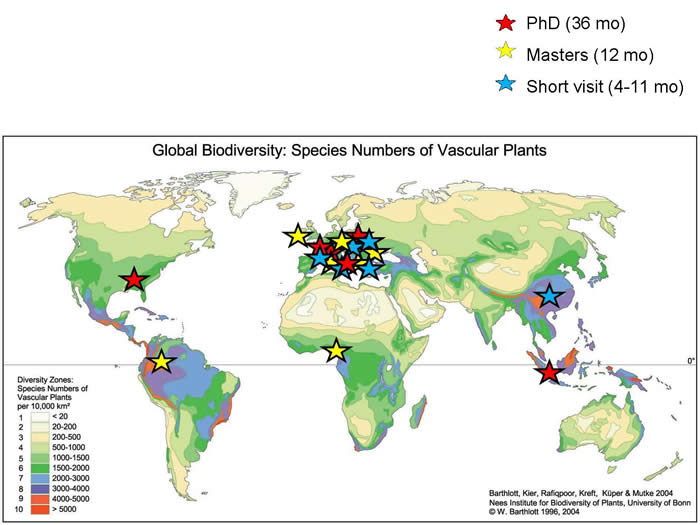
Early Stage Training in Biodiversity and Conservation (BIOCONS)
The Centre for Biodiversity and Conservation at the University of Leeds is an established Centre of Excellence in teaching and research, with an interdisciplinary structure encompassing a wide range of relevant fields of research. This broad base of established scientists makes the CBC a world-class training facility for work on the processes maintaining natural diversity, the tools for measuring and mapping it, and the techniques for preserving it in a changing environment. The key element of the BIOCONS programme has been to provide high-quality interdisciplinary training in biodiversity-related issues specialist taught courses and generic skills, tailored to meet the needs of the individual research fellow, most from areas in need of additional human resources in this field. A total of 21 fellows from 12 countries have benefited from this EU mobility initiative (see below map).
The short-term impact (on BIOCONS fellows, on other students in the participating labs and on supervisors) has been a resounding success. The long-term impact will be in terms of an improved biodiversity and conservation skill base in species-rich regions, and ultimately more effective conservation practice.
Training
We have provided three distinct forms of Fellowships under the new agreement: short-term visiting fellowships for specific research training, full-year Masters fellowships for broader training in biodiversity and conservation research, and three-year PhD fellowships for professional-level research training. All three involve a mixture of structured training, research and complementary skills instruction, and research experience, and provide opportunities for direct collaboration with biodiversity conservation professionals
The programme was delivered by an interactive group of 25 scientists with a wide range of research interests and complementary expertise in biodiversity and conservation. Our training site will build on the success of our FP5 MC training site in Biodiversity Assessment and Conservation Science (BACS) to provide high-quality interdisciplinary training in biodiversity-related issues.
This programme was funded by an award of €, from the Human Resources and Mobility (HRM) division of the EU Sixth Framework Programme, which supports training and mobility activities for researchers. These activities, known as the Marie Curie Actions, are aimed at the development and transfer of research competencies, the consolidation and widening of researchers' career prospects, and the promotion of excellence in European research. The detailed principles of Marie Curie Fellowships for Early Stage Training are explained in the following Handbook (pdf 1043 Kb).


